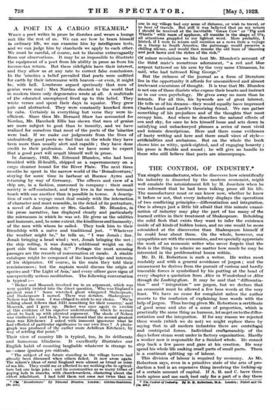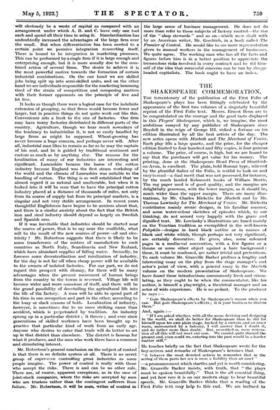THE CONTROL OF INDITSTRY.*
Tun simple manufacturerovhen he discovers how scientifically his industry is dissected by the modern economist, might well emulate the astonishment felt by M. Jourdain when he was informed that he had been talking prose all his life. The manufacturer must or can know now, whether he knew it before or not, that every industry displays the operations of two conflicting principles—differentiation and integration. One is always just a little bit afraid that this minute exami- nation of industry may play the part of too many of the learned critics in their treatment of Shakespeare. Beholding the solid flesh that exists they want to infer the existence inside of all kinds of hidden bones, and no one would be more astonished at the discoveries than Shakespeare himself if he could hear about them. On the whole, however, our sympathies are with the economists, and we specially appreciate the work of an economic writer who never forgets that the flesh is the thing to admire no matter how muclr he may be interested in the problematical bones within.
Mr. D. H. Robertson is such a writer. He writes most readably and with a general avoidance of jargon ; and the amusement he derives from the pursuit of curious and hardly traceable forces is symbolized by his putting at the head of every chapter a quotation from Alice in Wonderland or Alice through the Looking-glass. It may be said that " differentia- tion " and " integration " are jargon, but we declare that an economist must be allowed a few boss words at the very least. We have no cause for complaint unless the author resorts to the confusion of explaining boss words with the help of jargon. Thus having given Mr. Robertson a certificate of good sense and also of a sense of proportion, which is practically the same thing as humour, let us get onto the differ- entiation and the integration. If for any reason we rejected these words (which we do not) we might replace them by saying that in all modern industries there are centrifugal and centripetal forces. Individual craftsmanship of the days before steam went under in factory organization. Hardly a worker now is responsible for a finished whole. He cannot step back a few paces and gaze at his creation. He may spend his whole life making small parts of small parts. There is a continual splitting up of labour.
This division of labour is required by economy. As Mr. Robertson says, even in a primitive state of the arts of pro- duction a tool is an expensive thing involving the locking-up of a certain amount of capital. If A. B. and C. have three tools apiece and use each tool only for a part of a day there
• The Cenbvi of /mbar,. Bi D. M. Robertson, ILL. loadan; Nisbet and Co. [5e. lea)
will obviously be a waste of capital as compared with an arrangement under which A. B. and C. have only one tool each and spend all their time in using it. Standardization has undoubtedly increased the advantages of the large firm over the small. But when differentiation has been carried to a certain point we perceive integration reasserting itself. There is bound to be integration in marketing processes. This can be performed bye single firm if it is large enough and enterprising enough, but it is more usually due to the com- bined action of several firms. The desire to achieve it is the most powerful motive towards the formation of certain industrial combinations. On the one hand we see skilled jobs being split up into semi-skilled units, and on the other hand we see individuals responsible for the marketing becoming tired of the strain of competition and composing matters with their former opponents on the principle of live and let live.
It looks as though there were a logical case for the indefinite extension of grouping, so that firms would become fewer and larger, but in practice things do not quite work out like this. Convenience sets a limit to the size of factories. One firm may have many factories distributed in different parts of the country. Agriculture, though we hear much nowadays of the tendency to industrialize it, is not so easily handled by large firms as might be supposed. Wheat-growing has never become a huge concern, and perhaps never will. After all, industrial man lilies to remain as far as he may the captain of his soul, and he is guided by traditional sentiment and custom as much as by anything else. The reasons for the localization of many of eur industries are interesting and significant. Lancashire became the home of the cotton industry because England was the first steam workshop of the world and the climate of Lancashire was suitable to the handling of cotton. The thing is so well established that we almost regard it as natural and unalterable, but when it is looked into it will be seen that to have the principal cotton industry placed at a distance of thousands of miles, not only from its source of supply but from its principal markets, is a singular and not very stable arrangement. In recent years thoughtful Englishmen have begun to be anxious about that, and there is a similar anxiety about the fact that the British iron and steel industry should depend so largely on Swedish and Spanish ores.
If it was inevitable that industries should be started near the source of power, that is to say near the .coalfields, what will be the result of the new sources of power—oil and elec- tricity? Mr. Robertson suggests that there is likely to be some transference of the centres of manufacture to such countries as North Italy, Scandinavia and New Zealand, which have abundant supplies of falling water. Secondly, he foresees some decentralization and ruralization of industry, for the day is not far off when cheap power will be available to the owners of isolated factories. For our part, we do not regard this prospect with dismay, for there will be many advantages when the present movement of human beings from the country to the towns is reversed. Village life will become wider and more conscious of itself, and there will be the grand possibility of dovetailing the agricultural life into the life of the factory. A man will be able to spend part of his time in one occupation and part in the other, according to the busy or slack seasons of both. Localization of industry, however, is sometimes due to no more striking cause than accident, which is perpetuated by tradition. An industry sprang up in a particular district ; it throve ; and ever since generations of skilled workmen have been brought up to practise that particular kind of work from an early age. Anyone who desires to enter that trade will do better to set up in that district than elsewhere. The district is famous for what it produces, and the men who work there have a common and stimulating interest.
Mr. Robertson's general conclusion on the subject of control is that there is no definite system at all. There is no secret group of super-men controiling great industries as some people imagine. The power of control is really with those who accept the risks. There is and can be no other rule.
There are, of course, apparent exceptions, as in the case of joint-stock companies, where the risks are accepted by men who are trustees rather than the contingent sufferers from failure. Mr. Robertson, it will be seen, writes of control in
the large sense of business management. He does not do more than refer to those subjects of factory control—the rise of the "shop stewards" and so on—which were dealt with by an American writer, Mr. Goodrich, in a book called The Frontier of Control. He would like to see more representation given to manual workers in the management of businesses. We quite agree. The working man who has all the facts and figures before him is in a better position to appreciate the tremendous risks involved in every contract and to rid him- self of the idea that successful concerns can be run by sleepy. headed capitalists. The book ought to have an index.















































 Previous page
Previous page